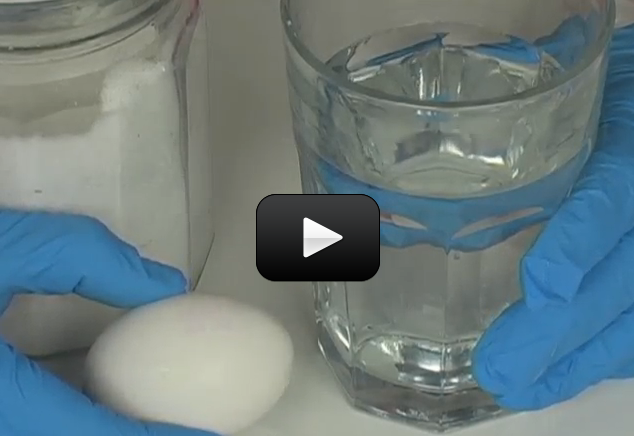Did you know that most people can’t crack an egg with only one hand without whacking it on something? The shell of an egg is quite strong! Try this over a sink and see if you can figure out the secret to cracking an egg in the palm of your hand…(Hint: the answer is below the video – check it out after you’ve tried it first!)
How can you tell if an egg is cooked or raw? Simply spin it on the counter and you’ll get a quick physics lesson in inertia…although you might not know it. A raw egg is all sloshy inside, and will spin slow and wobbly. A cooked egg is all one solid chunk, so it spins quickly. Remember the Chicken and the Clam experiment?
Please login or register to read the rest of this content.


No, leave it on 🙂
Do you take the shell off? thanks,Matthew
No – you can leave it on.
do we have to take the shell off after we boiled it?
You have to use something that will start a crack in the shell, like ring on your finder or the side of the bowl. When the crack starts, then squeeze the egg carefully until it starts to split open with only one hand.
We can’t find the secret to cracking an egg in one hand…
Thats so cool ! but what would it do if I put 10 scoops of salt and just 1 a scoop of water
Fresh eggs sink and remain flat (lengthwise) at the bottom of a cup of water, whereas older eggs tend to float. Eggs that are not quite fresh or old will stand up and not lay flat at the bottom.
The egg is basically an ongoing chemical reaction (albeit a slow one). As eggs age, the water in the shell slowly evaporates and is replaced by air and other gases. Fresh eggs contain a smaller air pocket than older eggs, which is why older eggs float. If you add salt to the water, you can get the fresh egg to float because the fresh egg is less dense than salty water, but more dense than fresh water.
Hi, we tried this experiment w/ an older egg & a newer egg. The older egg floated ever when we were boiling it & took less salt to float. Why does the older egg have less density? & a floating eggs in general question; Does the salt in the water make the water more dense & when there the same density do they cancel ea. other out? Is that why the eggs float? THX ♥
It’s easier to do with two eggs in your hand… my grandmother could crack two against each other, but not one.
OK, what IS the secret to cracking an egg in the palm of one hand without whacking it on something? I assume it’s poking into the side of the egg with your fingertips, but that’s a fairly messy way to do it… is your secret way any cleaner? 🙂
Yes, Thank you =)
We’re updating the videos on the site so this isn’t a problem in the future… we haven’t updated this video yet (there are over 600 for us to convert!). In the meantime, if you have this problem, hit PAUSE, then wait for it to load completely, then hit PLAY. Does that help?
The salty egg video stopped in the middle and we couldn’t get it to go on. Jasmin & Isabel Pitcher